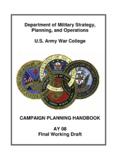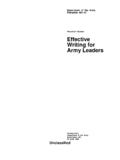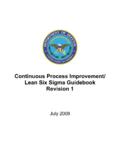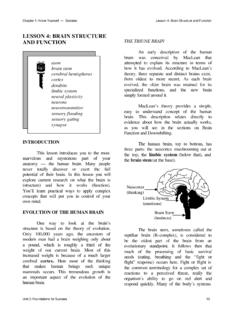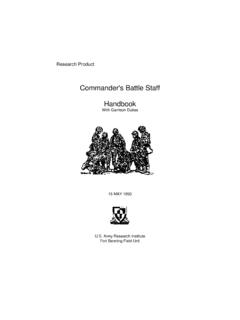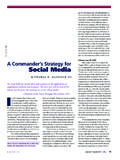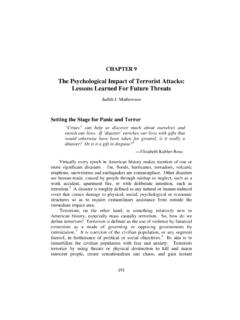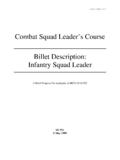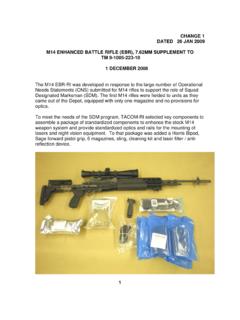Transcription of Twenty-Eight Articles: Fundamentals of Company-Level ...
1 29than you. But you have more combat power than you can or should use in most situations. Injudicious use of firepower creates blood feuds, homeless people and societal disruption that fuels and perpetuates the insurgency. The most beneficial actions are often local politics, civic action, and beat-cop behaviors. For your side to win, the people do not have to like you but they must respect you, accept that your actions benefit them, and trust your integrity and ability to deliver on promises, particularly regarding their security. In this battlefield popular perceptions and rumor are more influential than the facts and more powerful than a hundred this context, what follows a r e o b s e r v a t i o n s f r o m c o l l e c t i v e experience: the distilled essence of what those who went before you learned.
2 They are expressed as commandments, for clarity but are really more like folklore. Apply them judiciously and is short during pre-deployment, but you will never have more time to think than you have now. Now is your chance to prepare yourself and your Know your turf. Know the people, the topography, economy, history, religion and culture. Know every village, road, field, population group, tribal leader and ancient grievance. Your task is to become the world expert on your district. If you don t know precisely where you will be operating, study the general area. Read the map like a book: study it every night before sleep, and re-draw it from memory every morning, until you understand its patterns intuitively.
3 Develop a mental model of your area a framework in which to fit every new piece of knowledge you acquire. Study handover notes from predecessors; better still, get in touch with the unit in theater and pick their brains. In an ideal world, intelligence officers and area experts would brief you. This rarely happens: and even if it does, there is no substitute for personal mastery. Understand the broader area of influence this can be a wide area, particularly when insurgents draw on global grievances. Share out aspects of the operational area among platoon leaders and non-commissioned officers: have each individual develop a personal specialization and brief the others.
4 Neglect this knowledge, and it will kill Diagnose the problem. Once you know your area and its people, you can begin to diagnose the problem. Who are the insurgents? What drives them? What makes local leaders tick? Counterinsurgency is fundamentally a competition, between each side, to mobilize the population in support of its agenda. So you must understand what motivates the people and how to mobilize them. You need to know why and how the insurgents are getting followers. This means you need to know your real enemy, not a cardboard cut-out. The enemy is adaptive, resourceful and probably grew up in the region where you will operate. The locals have known him since he was a boy how long have they known you?
5 Your worst opponent is not the psychopathic terrorist of Hollywood, IntroductionYour company has just been warned for deployment on counterinsurgency operations in Iraq or Afghanistan. You have read David Galula, Lawrence and Robert Thompson. You have studied FM 3-24 and now understand the history, philosophy and theory of counterinsurgency. You watched Black Hawk Down and The Battle of Algiers, and you know this will be the most difficult challenge of your what does all that theory mean, at the company level? How do the principles translate into action - at night, with the GPS down, the media criticizing you, the locals complaining in a language you don t understand, and an unseen enemy killing your people by ones and twos?
6 How does counterinsurgency actually happen?There are no universal answers, and insurgents are among the most adaptive opponents you will ever face. Countering them will demand every ounce of your intellect. But be comforted: you are not the first to feel this way. There are tactical Fundamentals you can apply, to link the theory with the techniques and procedures you already Is Counterinsurgency?I f y o u h a v e n o t s t u d i e d counterinsurgency theory, here it is in a nutshell: this is a competition with the insurgent for the right and the ability to win the hearts, minds and acquiescence of the population. You are being sent in because the insurgents, at their strongest, can defeat anything with less strength Twenty-Eight Articles: Fundamentals of Company-Level Counterinsurgencyby Dr.
7 David Kilcullen, Lieutenant Colonel, Australian ArmyEditorial Abstract: The author presents a tactical-level preparatory guide, based on lessons learned from personal campaign experience. He emphasizes the necessity of proper mental and situational preparation, and offers a series of recommendations for applying concepts and ideas in the real world of personal-level influence Summer 2006or RPG, a shemagh and a water bottle if he is lucky. Unless you ruthlessly lighten your load and enforce a culture of speed and mobility, the insurgents will consistently out-run and out-maneuver you. But in lightening your load, make sure you can always reach back to call for firepower or heavy support if needed.
8 Also, remember to harden your CSS. The enemy will attack your weakest points. Most attacks on coalition forces in Iraq in 2004 and 2005, outside pre-planned combat actions like the two battles of Fallujah or Operation Iron Horse, were against CSS installations and convoys. You do the math. Ensure your CSS assets are hardened, have communications, and are trained in combat operations. They may do more fighting than your rifle Find a political/cultural adviser. In a force optimized for counterinsurgency, you m i g h t r e c e i v e a p o l i t i c a l /cultural adviser at company level: a diplomat or military foreign area officer, able to speak the language and navigate the intricacies of local politics.
9 Back on planet Earth, the Corps and Division commander will get a POLAD: you will not, so you must improvise. Find a political/cultural adviser from among your people - perhaps an officer, perhaps not (see article 8). Someone with people skills and a feel for the environment will do better than a political science graduate. Don t try to be your own cultural adviser: you must be fully aware of the political and cultural dimension, but this is a different task. Also, don t give one of your intelligence people this role. They can help, but their task is to understand the environment the political adviser s job is to help shape Train the squad leaders then trust them.
10 Counterinsurgency is a squad and platoon leader s war, and often a private soldier s war. Battles are won or lost in moments: whoever can bring combat power to bear in seconds, on a street corner, will win. The commander it is the charismatic follow-me warrior who would make your best platoon leader. His followers are not misled or na ve: much of his success is due to bad government policies or security forces that alienate the population. Work this problem collectively with your platoon and squad leaders. Discuss ideas, explore the problem, understand what you are facing, and seek a consensus. If this sounds unmilitary, get over it. Once you are in theater, situations will arise too quickly for orders, or even commander s intent.
